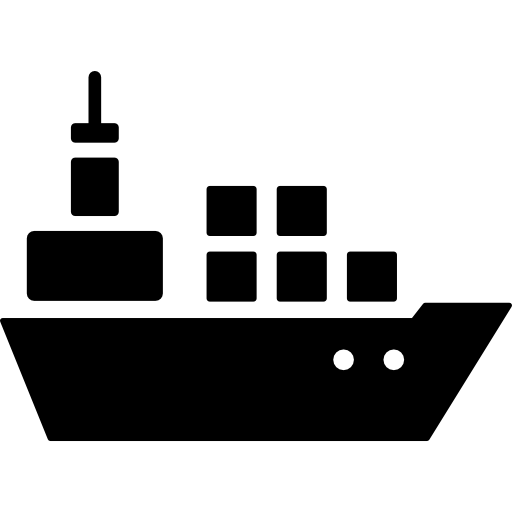Cargo refers to goods or produce carried in a truck, van, airplane, train, or ship. We can transport cargo by land, sea, or air.
The word freight has the same meaning. In this context, ‘produce‘ means things that have been made or grown, especially things connected with agriculture. For example, if the cargo is dairy produce, it could be cheese, yogurt, milk, cream, or butter.
We can also refer to livestock during transport, such as cattle, pigs, or chicken as cargo. When we transport humans, however, we refer to them as passengers or crew.
The term ‘shipping’ refers to the transportation of cargo.
As global commerce expands, the efficiency of cargo handling and logistics becomes crucial, often leveraging advanced technology to track and manage the movement of goods worldwide.
Initially, cargo referred to freight on ships
Cargo originally only referred to a load on a ship. However, today we use it for any type of freight, including loads carried by planes, motor vehicles, trains, and ships or boats.
In most cases, transporters or shipping companies carry cargo for commercial gain. However, when emergency supplies are being carried to, for example, a disaster zone and the carrier is not making a profit, we might still refer to it as cargo.
Types of cargo
Not all cargo is the same. Goods can be packaged and transported in different forms depending on their nature.
Listed below are some common types of cargo and what they mean:
Bulk cargo
Bulk cargo refers to commodities that are transported unpackaged in large quantities . These are usually poured or piled directly into a transport vessel’s hold without individual packaging. There are two kinds of bulk cargo:
- Dry Bulk: Solid goods like grains, coal, iron ore, or sugar that are carried loose (imagine huge heaps of grain or coal filling up a ship’s storage hold).
- Liquid Bulk: Liquid goods like crude oil, gasoline, or chemicals, usually transported in tanker ships or tank trucks with large tanks. For example, an oil tanker ship carries millions of barrels of oil as liquid bulk cargo.
Break bulk cargo
Break bulk cargo consists of goods that are packaged or bundled as separate units (but not in standard shipping containers).
These might be items in boxes, crates, barrels, or on pallets that are loaded individually onto a ship or truck.
Before containerization became common, break bulk was the main way goods were shipped by sea. Examples include sacks of coffee beans, crates of machinery, or rolls of steel. Each unit is handled piece by piece when loading or unloading. This is more labor-intensive than containerized shipping, but it’s used for cargo that either doesn’t fit in containers (like an oversized machine) or is being delivered to ports that cannot handle large containers.
Containerized Cargo
This is one of the most common forms of cargo today.
Containerized cargo means goods are packed into standard intermodal containers – usually the large metal boxes you see on ships, trains, or trucks . The standard size is often a 20-foot or 40-foot container (20-foot equivalent units are called “TEUs”).
These containers can hold all sorts of products: electronics, clothing, furniture, toys, etc. Because the container is sealed and easily moved by cranes, it’s a very efficient way to handle cargo. A container can be transferred from a ship to a train or truck easily, which is why this system is called intermodal (multiple modes) transport. Most items you find in stores – like smartphones, shoes, or appliances – traveled part of their journey in a cargo container.
Liquid Cargo
We covered liquid bulk above (like oil), but it’s worth noting as its own category because handling liquids is special. Liquid cargo includes fluids transported in bulk – such as oil, natural gas (often shipped as LNG in specialized tankers), chemicals, milk, or even water.
These products are typically moved in tankers – for example, an oil pipeline or oil tanker ship for petroleum, or tanker trucks for things like milk or fuel.
Liquid cargo needs tanks and sometimes temperature controls (for chemicals or liquefied gases). It’s pumped on and off the vehicle rather than lifted by crane.
Air freight (air cargo)
Air freight refers to goods shipped by airplane. Air cargo is usually high-value, low-weight, or time-sensitive items – because flying is fast but expensive. Examples include electronic parts, medical supplies, express parcels, or fresh flowers and seafood (which need to reach markets quickly).
Air cargo is often packed on pallets or in ULDs (Unit Load Devices) – these are special containers or pallets that fit into an aircraft’s cargo space. Air freight might be a small package shipped overnight to your house, or larger pallets of products in a dedicated cargo plane’s hold. Compared to sea or land, air carries a smaller fraction of total cargo by weight, but it’s crucial for speedy delivery.
Roll-on/roll-off cargo
This type refers to vehicles or wheeled machinery that can be driven on and off a ship or ferry. Instead of lifting the cargo in with a crane, the items have wheels.
For example, car manufacturers ship new cars using roll-on/roll-off ships – large car carrier vessels where cars, buses, or even construction vehicles are literally driven (rolled) on at the departure port and rolled off at the destination port.
This is efficient for transporting vehicles because it doesn’t require cranes – the ship is like a floating parking garage. Heavy trucks and trains can also be transported this way (some ferries let trucks drive on, carrying their loads).
Transport modes

Ship (Sea Freight)
- Speed: Slow (days to weeks)
- Cost: Lowest per ton
- Capacity: Extremely high
- Use Case: Large volumes, non-urgent cargo
- Typical Transit Time: 10-30 days for intercontinental routes
- Common Cargo: Bulk commodities, containerized goods
- Environmental Impact: Lower CO₂ per ton than air or road, but uses heavy fuel

Train (Rail Freight)
- Speed: Moderate
- Cost: Low
- Capacity: Very high
- Use Case: Heavy goods over long distances
- Typical Transit Time: 1-7 days (depends on route)
- Common Cargo: Coal, ores, containers, grain
- Environmental Impact: Generally lower emissions than trucks per ton

Truck (Road Freight)
- Speed: Moderate
- Cost: Medium
- Capacity: Moderate
- Use Case: Door-to-door, last-mile deliveries
- Typical Transit Time: Hours to a few days
- Common Cargo: Retail goods, perishable foods, general merchandise
- Environmental Impact: Flexible but typically higher CO₂ per ton than rail

Airplane (Air Freight)
- Speed: Fastest
- Cost: Highest per ton
- Capacity: Limited
- Use Case: Urgent or high-value items
- Typical Transit Time: Hours to 1-2 days globally
- Common Cargo: Electronics, medical supplies, express parcels
- Environmental Impact: Highest emissions per ton among freight modes
Where does the word ‘cargo’ come from?
According to Etymonline.com, the word first appeared in the English language in the 1650 with the meaning “freight loaded on a ship.” It came from the Spanish word “Cargo,” meaning “burden,” which came from the Spanish word “Cargar,” meaning “to load, impose taxes.”
The Spanish word came from the Latin Word “Carricare,” which meant “to load a wagon or cart.” The Latin word “Carrus“ meant “wagon.”
Carrier insurance and cargo insurance
In most jurisdictions, carriers must carry a minimum amount of cargo insurance. People in the industry refer to it as carrier liability. However, carrier liability protects the carrier more than the cargo.
Most shippers, especially if their cargo is large, should take out cargo insurance to protect goods from damage, theft, or loss while in transit.
There is typically insurance coverage for the goods while they are in transit or being stored, until the buyer has them.
When insuring freight, it is important to read the small print, because most policies have limitations. In the US, for example, insurance for freight being shiped by truck does not provide protection against every type of loss.
A voyage policy is a type of insurance policy that provides coverage due to unforseen risks to marine cargo.
Risks
Containers sometimes fall overboard or are released by sea vessels during severe storms.
In 2017, 130 million freight containers were transported by sea. According to the World Shipping Council, those containers held more than $12 trillions’ worth of cargo.
Out of that total, 10,000 containers fell into the sea due to high seas, severe weather conditions, incorrect stowage, and various types of accidents.
Ten thousand, out of 130 million, does not sound like that many. However, if they were your cargo it could be catastrophic. That is why insuring your merchandise is important.
Since 2023, global shipping has been affected by the Red Sea Crisis; resulting in longer transit times, increased costs, and capacity shortages. The cost of routes from Asia to Europe surged astronomically.
International trade and security concerns
Governments across the world strive to try to make sure that cargo shipments coming in from abroad do not pose a security risk for the country. Many have introduced laws, which customs agencies administer, regarding the handling of cargo to minimize the risks of, for example, terrorism. Governments are also concerned about narcotics and weapons entering the country illegally.
Ever since the terrorist attacks of September 11th, 2001, the United States has been monitoring the cargo that enters the country much more closely. More than six million cargo containers come in through US ports each year.
Environmental considerations are becoming increasingly important in cargo transportation, with companies seeking more sustainable practices to reduce carbon footprints and improve efficiency.
